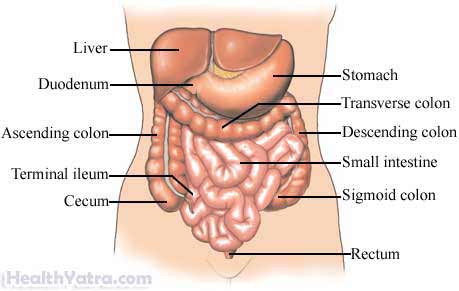Definition
Antibiotic-associated colitis is an irritation in your large intestine. It happens when there is a disruption in the bacteria of your intestines after taking antibiotic medication. Colitis can lead to diarrhea and abdominal cramping.
One type of bacteria that can cause this colitis is called C. difficile. This bacteria can spread easily from person to person or from contaminated surface s . An infection with this bacteria is most common in people staying in hospitals or other care centers. The infection is often very serious.

Causes
Your intestine is normally full of good bacteria. When you take antibiotics, they often kill all the good bacteria in your intestine. This creates a perfect home for bacteria called C. difficile. This particular bacteria is not killed by the antibiotics and begins to grow out of control. As it grows, the bacteria makes toxins. These toxins irritate the lining of the intestine and cause swelling, leading to pain and diarrhea.
Risk Factors
Factors that increase your chance of having this condition include:
- You use antibiotics.
- You are elderly.
- You are or have been hospitalized or a long-term care resident.
- You have a severe illness.
Other possible risk factors include:
- Enteral feeding —nutrition is delivered through a tube
- Taking medicine that decreases the amount of acid the stomach makes.
- Surgery of the stomach or intestine
- Other stomach or intestine conditions such as Crohn’s disease or ulcerative colitis
- Pregnancy
- Chemotherapy
- Bone marrow transplant
Symptoms
If you have any of these symptoms, do not assume it is due to antibiotic-associated colitis. These symptoms may be caused by other health conditions. See your doctor if you have:
- Loose stools
- Watery or mucousy diarrhea
- Abdominal pain
- Fever
- Nausea and vomiting (rare)
- Dehydration
- Low blood pressure
Diagnosis
Your doctor will ask about your symptoms and medical history. A physical exam will be done. Tests may include:
- Stool samples —to identify the toxins made by the bacteria
- CT scan —a type of x-ray that uses a computer to make pictures of the inside of the body
- Colonoscopy —a thin, lighted tube inserted through the rectum and into the colon to examine the lining of the colon
Treatment
If you are diagnosed with this condition, follow your doctor’s instructions .
Talk with your doctor about the best treatment plan for you. Treatment options include the following:
Fluid Replacement
Severe diarrhea can make it difficult for your body to take in and keep fluids. You may have fluid treatments to help replace lost fluids. Your doctor may simply encourage you to drink more fluids. For severe fluid loss your doctor may recommend an IV to deliver fluids directly to your bloodstream.
Medications
The first step is to stop taking your current antibiotic. The colitis usually goes away within two weeks of stopping the current antibiotic. Talk with your doctor first before stopping the antibiotic.
You may be given a different antibiotic that is known to kill C. difficile.
You may also be given probiotics. These are healthy bacteria that will help your intestine get back to normal. Try not to use antidiarrheal drugs such as loperamide and opiates.
Surgery
In very severe cases, surgery may be needed. This is rare.
Surgery may be needed to remove the affected part of the intestine. This is called acolectomy. The small intestine may also be connected to an opening in the abdominal wall. This will allow waste to pass to a bag outside of the body.
Prevention
There are a few steps that may help you avoid this infection.
- Be aware of the role of antibiotics:
- Reduce your use of antibiotics. Antibiotics should only be used when your doctor has confirmed that you have a bacterial infection.
- If you are prescribed antibiotics, ask your doctor if you should take a probiotic also. Probiotics may help protect the normal bacterial growth in your intestines.
- This type of infection can spread easily. To help prevent any infection:
- Wash your hands often with soap and water.
- If you are in a care facility make sure any health care staff are washing their hands before coming in contact with you. Ask your visitors to wash their hands while visiting with you.
- Keep in mind that C. difficile can also pass through contact with infected surfaces. To avoid spreading an infection:
- Make sure to clean any affected surfaces with a disinfectant that contains bleach if someone has had an infection at home.
- Precautions will be taken in the hospital if you have a C. difficile infection. This should include gloves and protective gowns for staff or visitors.
Clostridioides Treatment in India – Page Keywords:
Clostridioides Definition, Clostridioides Definition Causes, Clostridioides Symptoms, Clostridioides Treatment in India, Clostridioides Treatment Cost in India, Clostridioides Surgery Cost, Top Clostridioides Treatment Hospital, Top Clostridioides Treatment Doctor in India, Clostridioides Meaning in Marathi, Clostridioides Treatment Near me, Clostridioides Complications, Travel India for Clostridioides Treatment, Clostridioides Treatment in Arab Countries, Clostridioides Treatment in Bangladesh, Clostridioides Treatment in Dhaka, Clostridioides Meaning in Bengali, Clostridioides Meaning in Arabic, Clostridioides Meaning in Hindi, Clostridioides Treatment in Bahrain, Clostridioides Treatment in Egypt, Clostridioides Treatment in Iraq, Clostridioides Treatment in Jordan, Clostridioides Treatment in Kuwait, Clostridioides Treatment in Lebanon, Clostridioides Treatment in Saudi Arabia, Clostridioides Treatment in United Arab Emirates, Clostridioides Treatment in Sudan, Clostridioides Treatment in Tunisia, Clostridioides Treatment in Nepal, Clostridioides Treatment cost,
